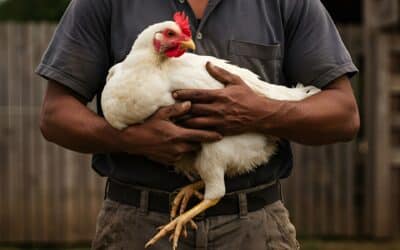Infectious Bursal Disease (IBD) is a highly contagious viral infection that targets the immune system of young chickens. It poses a serious threat to commercial poultry production, weakening birds’ immunity and increasing susceptibility to secondary infections.
Understanding how IBD in poultry spreads, how to detect infectious bursal disease symptoms, and when to test can significantly improve disease management and reduce flock losses.
How IBD in Poultry Affects Flock Health and Productivity
IBD in poultry primarily affects the bursa of Fabricius—a critical organ for immune development in young birds, especially between 3 and 6 weeks old. Once infected, chickens often become immunosuppressed, reducing vaccine effectiveness and increasing vulnerability to other diseases.
Beyond the direct impact on bird health, IBD disease in poultry can lead to significant economic losses through:
- Reduced weight gain and poor feed conversion
- Increased mortality
- Higher medication and veterinary costs
- Downtime due to biosecurity management
Prompt identification and control are essential for maintaining flock productivity and minimising operational disruptions.
Infectious Bursal Disease Symptoms That Trigger Testing
Spotting infectious bursal disease symptoms early can make a major difference in how outbreaks are contained.
The veterinarian will investigate the following signs:
- Ruffled feathers
- Dehydration
- Diarrhoea
- Depression or lethargy
- Swelling or haemorrhaging
- High mortality in young birds
IBD symptoms often resemble other poultry diseases, making laboratory testing the only way to confirm diagnosis with certainty.
Sampling Best Practices for Confirming IBD in Poultry
To confirm infectious bursal disease in chickens, proper sample collection is essential.
Recommended IBD sampling includes:
- Bursa of Fabricius: Collected from recently deceased birds (within 6 hours) for histopathology or virus isolation
- Spleen and thymus tissue: Helps in confirming the extent of immunosuppression
- Blood samples: For serology or antibody detection
- Cloacal swabs: For molecular diagnostic methods like PCR
Working with a trusted lab for veterinary diagnostic testing for IBD ensures your samples are processed under proper biosecurity and with advanced diagnostic accuracy.
Infectious Bursal Disease in Chickens: Confirmation through Lab Testing
To effectively manage infectious bursal disease in chickens, confirmation through lab testing is critical. Common methods include:
- Histopathology: Identifies characteristic lesions in the bursa
- PCR Testing: Detects the virus rapidly and with high sensitivity
- Serology (ELISA): Measures immune response and can be used for surveillance
Confirming IBD quickly allows for faster interventions, such as enhanced biosecurity, strategic vaccination, or isolation of infected birds.
Need Support with IBD Testing and Confirmation?
AssureCloud’s veterinary diagnostics team offers expert support in detecting and managing infectious bursal disease in chickens.
We work with poultry operations to develop proactive disease control strategies through accurate lab diagnostics, and efficient sampling protocols.
Contact us to book your IBD test or to speak with a specialist. With a clinical diagnosis from a consulting vet, the farm will be guided to submit the correct samples taken by the vet.
Partner with AssureCloud for trusted, high-quality veterinary diagnostics that support healthier flocks and stronger operations.


